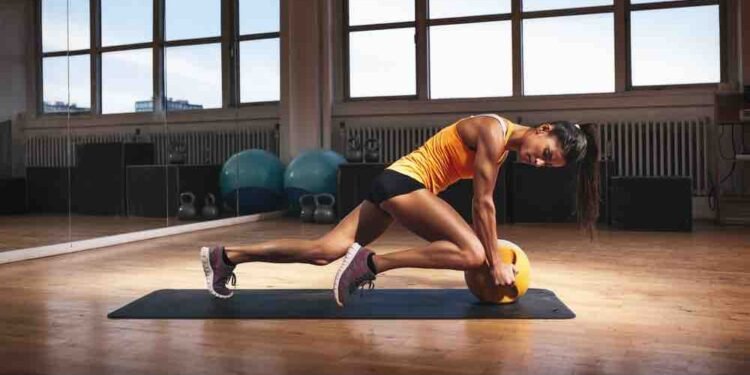Brussels (Brussels Morning Newspaper) – Metabolism refers to the chemical processes that occur within the body to maintain life, and it includes both anabolic (building up) and catabolic (breaking down) processes. Exercise can have a significant impact on metabolism. It has a positive impact on metabolism by increasing the metabolic rate, increasing muscle mass, and improving insulin sensitivity. These benefits can lead to a healthier body composition, improved energy levels, and a reduced risk of certain chronic diseases and blood pressure.
What Are The Two Types Of Metabolism?
There are two types of metabolism: anaerobic and aerobic metabolism. Anaerobic metabolism occurs during high-intensity exercises, such as strength training or sprinting. During anaerobic metabolism, the body breaks down glucose to produce energy without using oxygen. This process is less efficient than aerobic metabolism and can only be sustained for short periods.
Aerobic metabolism occurs during lower-intensity exercises, such as jogging, cycling, or swimming. During aerobic metabolism, the body uses oxygen to break down glucose and fats to produce energy. During this process the body burns more calories. It is more efficient than anaerobic metabolism and can be sustained for longer periods.
Does Exercise Increase Metabolism?
Yes, exercise boosts your metabolism. When you exercise, your body uses more energy, which leads to an increase in metabolic rate. This increase in metabolic rate can last for several hours after you finish exercising. This helps you to lose weight and burn off the extra calories.
Regular exercise can increase your metabolism, meaning your body burns more calories even when you are at rest. This is because exercise can increase muscle mass, and muscle requires more energy to maintain than fat.
Several factors contribute to the increase in metabolism during and after exercise, including:
- Muscle activity: Exercise stimulates muscle activity, which requires energy and contributes to an increase in metabolism.
- Increased heart rate: Exercise increases heart rate, which increases blood flow and oxygen delivery to the muscles, helping them work more efficiently.
- Thermic effect of food: Exercise can increase the thermic effect of food. It is the energy required to digest and absorb nutrients from food.
- Hormonal changes: Exercise can also stimulate the production of hormones such as adrenaline. This can increase metabolic rate.
How Does Exercise Affect Your Metabolism?
Exercise can have a significant impact on metabolism, both during and after physical activity. Here are some of the ways exercise can affect your metabolism:
- Increases energy expenditure: Exercise increases energy expenditure by burning calories, which can help you lose weight and maintain healthy body composition.
- Improves insulin sensitivity: Exercise can improve insulin sensitivity. This makes it easier for your body to use glucose for energy and reduces the risk of developing type 2 diabetes.
- Increases muscle mass: Exercise can increase muscle mass. This can help boost metabolism, as muscle tissue burns more calories than fat tissue.
- Boosts metabolic rate: Exercise can boost metabolic rate, which is the rate at which your body burns calories. This effect can last for several hours after exercise, depending on the intensity and duration of the workout.
- Promotes fat oxidation: Exercise can also promote fat oxidation. This means your body burns fatter for fuel during exercise, and even after exercise has ended.
Exercise can have a significant impact on your metabolism. It leads to promoting weight loss, improving insulin sensitivity, increasing muscle mass, boosting metabolic rate, and fat oxidation.
How Can You Increase Your Metabolism With Exercise?
Regular exercise can help increase your metabolism, which is the rate at which your body burns calories. Here are some ways to increase your metabolism with exercise:
1. Aerobic Exercise
Cardiovascular exercises such as running, cycling, swimming, or brisk walking can help increase your heart rate and metabolism during and after your workout.
2. Resistance Training
Strength training exercises such as weight lifting or bodyweight exercises like push-ups and squats can help increase your muscle mass. This in turn can increase your metabolism.
3. High-Intensity Interval Training (HIIT)
HIIT involves alternating between periods of high-intensity exercise and periods of rest or low-intensity exercise. This type of workout can help increase your metabolism and burn more calories in a shorter amount of time.
Read More: Popularity Of Online Fitness Classes: What Are People Looking For In Online Fitness Classes?
4. Stay Active Throughout the Day
In addition to structured exercise, staying active throughout the day can help increase your metabolism. Take breaks to walk around and stretch, take the stairs instead of the elevator, and find ways to incorporate movement into your daily routine.
Remember, while exercise can help increase your metabolism, it is not a magic solution. It is important to also maintain a healthy diet and lifestyle to see the best results.




